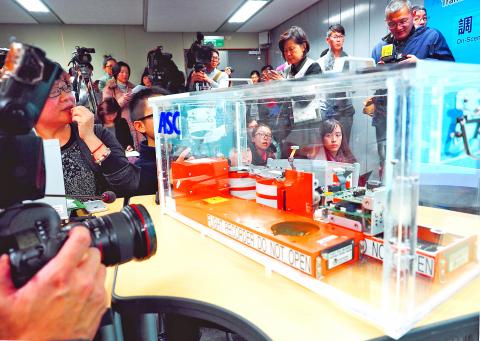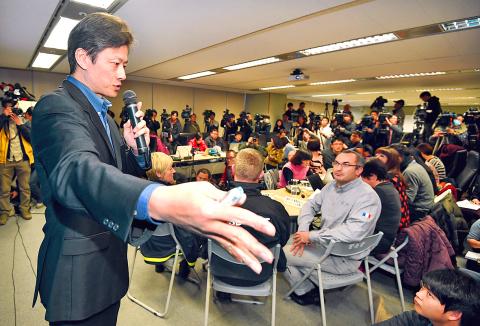The Aviation Safety Council yesterday revealed preliminary information from the flight data recorder (FDR) and cockpit voice recorder of the crashed TransAsia Airways Flight GE235, showing that the pilots may have mistakenly turned off the engine that could have kept it airborne.
Council executive director Thomas Wang (王興中) said that the master warning for the No. 2 engine was triggered about 37 seconds after takeoff, which indicated that the engine had flamed out. During that time, the airplane was flying at an altitude of 457m, he said.
Wang also said that the propellers of the No. 2 engine went into the feathered mode after the flame-out signal. The auto-feather system is activated when the power of the engine becomes insufficient to produce the thrust, he said, adding that the system helps reduce drag during an engine failure.

Photo: EPA
“Even though the flame-out alarm went off, the engine did not actually flame out and was still running,” Wang said, adding that the aircraft’s dashboard should have informed the pilot that it was the No. 2 engine that had malfunctioned.
Despite the problem with the No. 2 engine, Wang said that the flight crew did not shut it down, but decided to increase its throttle.
Wang said that although there was no sign of abnormality with the No. 1 engine, the flight crew manually turned it off when the airplane climbed to 488m, leading that engine to go into feathered mode as well.

Photo: Liao Chen-hui, Taipei Times
The flight crew later tried to restart the No. 1 engine, but did not have enough time to power the engine back into full operation, Wang said.
The data further showed that the aircraft had sounded a stall warning five times before the FDR stopped recording.
After the third stall warning, the flight crew contacted the control tower and called out: “Mayday, Mayday, engine flame-out.”
The council also showed the data plot from the FDR of the engines, which indicated that both engines had operated normally before the No. 2 engine went into feathered mode.
As to what led to the failure of the No. 2 engine and why the flight crew decided to turn off the No. 1 engine following a brief discussion, Wang said that these questions could only be answered after further investigation.
Previously, media reports had speculated that the problem could be with the No. 1 engine, as the company had replaced it twice since it acquired the aircraft from the French manufacturer.
Yann Torres, a representative from the French Bureau of Enquiry and Analysis for Civil Aviation, also attended the press conference and confirmed that the ATR 72-600 airplanes are able to operate with one engine, even during take-off.
Meanwhile, the Civil Aeronautics Administration (CAA) said that all pilots operating ATR 72 models are to be retrained.
Clark Lin (林俊良), director of the administration’s flight standards division, said that the airline has 71 pilots trained to fly ATR 72 planes, adding that they would be required to take an oral test on operating the aircraft.
The test would be administered over four days, beginning today, he said.
Lin said that pilots could still fly the airplanes before they take the test, because they are qualified pilots.
However, they must finish the test within four days and would be asked to be requalified as pilots if they fail the test, Lin said.
The pilots would later be asked to operate a flight simulator as well.
CAA statistics showed that of five TransAsia Airways incidents between 2010 and last year that involved problems with an engine, two of them were attributed to human error.

The US government has signed defense cooperation agreements with Japan and the Philippines to boost the deterrence capabilities of countries in the first island chain, a report by the National Security Bureau (NSB) showed. The main countries on the first island chain include the two nations and Taiwan. The bureau is to present the report at a meeting of the legislature’s Foreign Affairs and National Defense Committee tomorrow. The US military has deployed Typhon missile systems to Japan’s Yamaguchi Prefecture and Zambales province in the Philippines during their joint military exercises. It has also installed NMESIS anti-ship systems in Japan’s Okinawa

‘WIN-WIN’: The Philippines, and central and eastern European countries are important potential drone cooperation partners, Minister of Foreign Affairs Lin Chia-lung said Minister of Foreign Affairs Lin Chia-lung (林佳龍) in an interview published yesterday confirmed that there are joint ventures between Taiwan and Poland in the drone industry. Lin made the remark in an exclusive interview with the Chinese-language Liberty Times (the Taipei Times’ sister paper). The government-backed Taiwan Excellence Drone International Business Opportunities Alliance and the Polish Chamber of Unmanned Systems on Wednesday last week signed a memorandum of understanding in Poland to develop a “non-China” supply chain for drones and work together on key technologies. Asked if Taiwan prioritized Poland among central and eastern European countries in drone collaboration, Lin

Renewed border fighting between Thailand and Cambodia showed no signs of abating yesterday, leaving hundreds of thousands of displaced people in both countries living in strained conditions as more flooded into temporary shelters. Reporters on the Thai side of the border heard sounds of outgoing, indirect fire yesterday. About 400,000 people have been evacuated from affected areas in Thailand and about 700 schools closed while fighting was ongoing in four border provinces, said Thai Rear Admiral Surasant Kongsiri, a spokesman for the military. Cambodia evacuated more than 127,000 villagers and closed hundreds of schools, the Thai Ministry of Defense said. Thailand’s military announced that

CABINET APPROVAL: People seeking assisted reproduction must be assessed to determine whether they would be adequate parents, the planned changes say Proposed amendments to the Assisted Reproduction Act (人工生殖法) advanced yesterday by the Executive Yuan would grant married lesbian couples and single women access to legal assisted reproductive services. The proposed revisions are “based on the fundamental principle of respecting women’s reproductive autonomy,” Cabinet spokesperson Michelle Lee (李慧芝) quoted Vice Premier Cheng Li-chiun (鄭麗君), who presided over a Cabinet meeting earlier yesterday, as saying at the briefing. The draft amendment would be submitted to the legislature for review. The Ministry of Health and Welfare, which proposed the amendments, said that experts on children’s rights, gender equality, law and medicine attended cross-disciplinary meetings, adding that